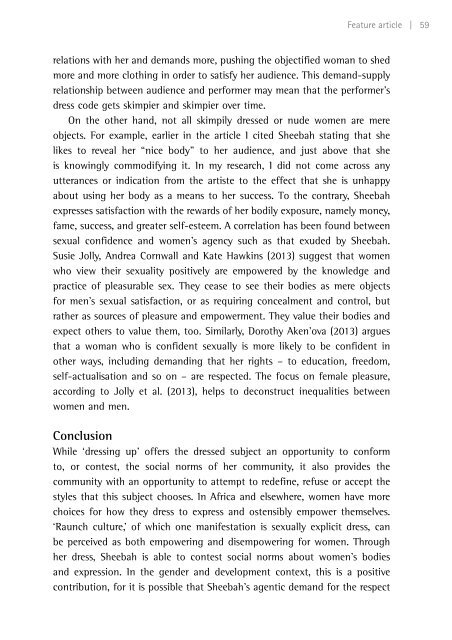The politics of fashion and beauty in Africa
fa21_proof_3
fa21_proof_3
You also want an ePaper? Increase the reach of your titles
YUMPU automatically turns print PDFs into web optimized ePapers that Google loves.
Feature article | 59<br />
relations with her <strong>and</strong> dem<strong>and</strong>s more, push<strong>in</strong>g the objectified woman to shed<br />
more <strong>and</strong> more cloth<strong>in</strong>g <strong>in</strong> order to satisfy her audience. This dem<strong>and</strong>‐supply<br />
relationship between audience <strong>and</strong> performer may mean that the performer’s<br />
dress code gets skimpier <strong>and</strong> skimpier over time.<br />
On the other h<strong>and</strong>, not all skimpily dressed or nude women are mere<br />
objects. For example, earlier <strong>in</strong> the article I cited Sheebah stat<strong>in</strong>g that she<br />
likes to reveal her “nice body” to her audience, <strong>and</strong> just above that she<br />
is know<strong>in</strong>gly commodify<strong>in</strong>g it. In my research, I did not come across any<br />
utterances or <strong>in</strong>dication from the artiste to the effect that she is unhappy<br />
about us<strong>in</strong>g her body as a means to her success. To the contrary, Sheebah<br />
expresses satisfaction with the rewards <strong>of</strong> her bodily exposure, namely money,<br />
fame, success, <strong>and</strong> greater self-esteem. A correlation has been found between<br />
sexual confidence <strong>and</strong> women’s agency such as that exuded by Sheebah.<br />
Susie Jolly, Andrea Cornwall <strong>and</strong> Kate Hawk<strong>in</strong>s (2013) suggest that women<br />
who view their sexuality positively are empowered by the knowledge <strong>and</strong><br />
practice <strong>of</strong> pleasurable sex. <strong>The</strong>y cease to see their bodies as mere objects<br />
for men’s sexual satisfaction, or as requir<strong>in</strong>g concealment <strong>and</strong> control, but<br />
rather as sources <strong>of</strong> pleasure <strong>and</strong> empowerment. <strong>The</strong>y value their bodies <strong>and</strong><br />
expect others to value them, too. Similarly, Dorothy Aken’ova (2013) argues<br />
that a woman who is confident sexually is more likely to be confident <strong>in</strong><br />
other ways, <strong>in</strong>clud<strong>in</strong>g dem<strong>and</strong><strong>in</strong>g that her rights – to education, freedom,<br />
self-actualisation <strong>and</strong> so on – are respected. <strong>The</strong> focus on female pleasure,<br />
accord<strong>in</strong>g to Jolly et al. (2013), helps to deconstruct <strong>in</strong>equalities between<br />
women <strong>and</strong> men.<br />
Conclusion<br />
While ‘dress<strong>in</strong>g up’ <strong>of</strong>fers the dressed subject an opportunity to conform<br />
to, or contest, the social norms <strong>of</strong> her community, it also provides the<br />
community with an opportunity to attempt to redef<strong>in</strong>e, refuse or accept the<br />
styles that this subject chooses. In <strong>Africa</strong> <strong>and</strong> elsewhere, women have more<br />
choices for how they dress to express <strong>and</strong> ostensibly empower themselves.<br />
‘Raunch culture,’ <strong>of</strong> which one manifestation is sexually explicit dress, can<br />
be perceived as both empower<strong>in</strong>g <strong>and</strong> disempower<strong>in</strong>g for women. Through<br />
her dress, Sheebah is able to contest social norms about women’s bodies<br />
<strong>and</strong> expression. In the gender <strong>and</strong> development context, this is a positive<br />
contribution, for it is possible that Sheebah’s agentic dem<strong>and</strong> for the respect



